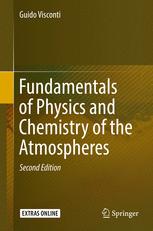

Most ebook files are in PDF format, so you can easily read them using various software such as Foxit Reader or directly on the Google Chrome browser.
Some ebook files are released by publishers in other formats such as .awz, .mobi, .epub, .fb2, etc. You may need to install specific software to read these formats on mobile/PC, such as Calibre.
Please read the tutorial at this link: https://ebookbell.com/faq
We offer FREE conversion to the popular formats you request; however, this may take some time. Therefore, right after payment, please email us, and we will try to provide the service as quickly as possible.
For some exceptional file formats or broken links (if any), please refrain from opening any disputes. Instead, email us first, and we will try to assist within a maximum of 6 hours.
EbookBell Team

4.3
98 reviewsThis book is an introductory course to the physics and chemistry of the atmosphere and to climate dynamics. It covers the basics in thermodynamics, fluid dynamics, radiation, and chemistry and explains the most intriguing problems that currently exist in the study of the atmospheres of the Earth and planets. A particular effort is made to approach the different topics intuitively. Among the themes covered are the most recent evolution concerning the chemistry of polluted troposphere, the global warming problem, and chaos and nonlinear theory.
The book is almost completely rewritten in comparison to the previous edition, with a more logical organization of the chapters. The fundamentals of thermodynamics, radiation, fluid dynamics and chemistry are introduced in the first six chapters, including a new chapter on remote sensing. Also there is an additional chapter on geoengineering. A significant addition to the new edition, at the end of each chapter, are examples where the topics introduced in the chapter are further discussed with application to classical problems or new research items. Many of these examples are accompanied by computer programs. The most important updates deal with the theory of the general circulation, the methods to evaluate GCM, the detailed discussion of the urban troposphere and the chaos and nonlinear phenomena.